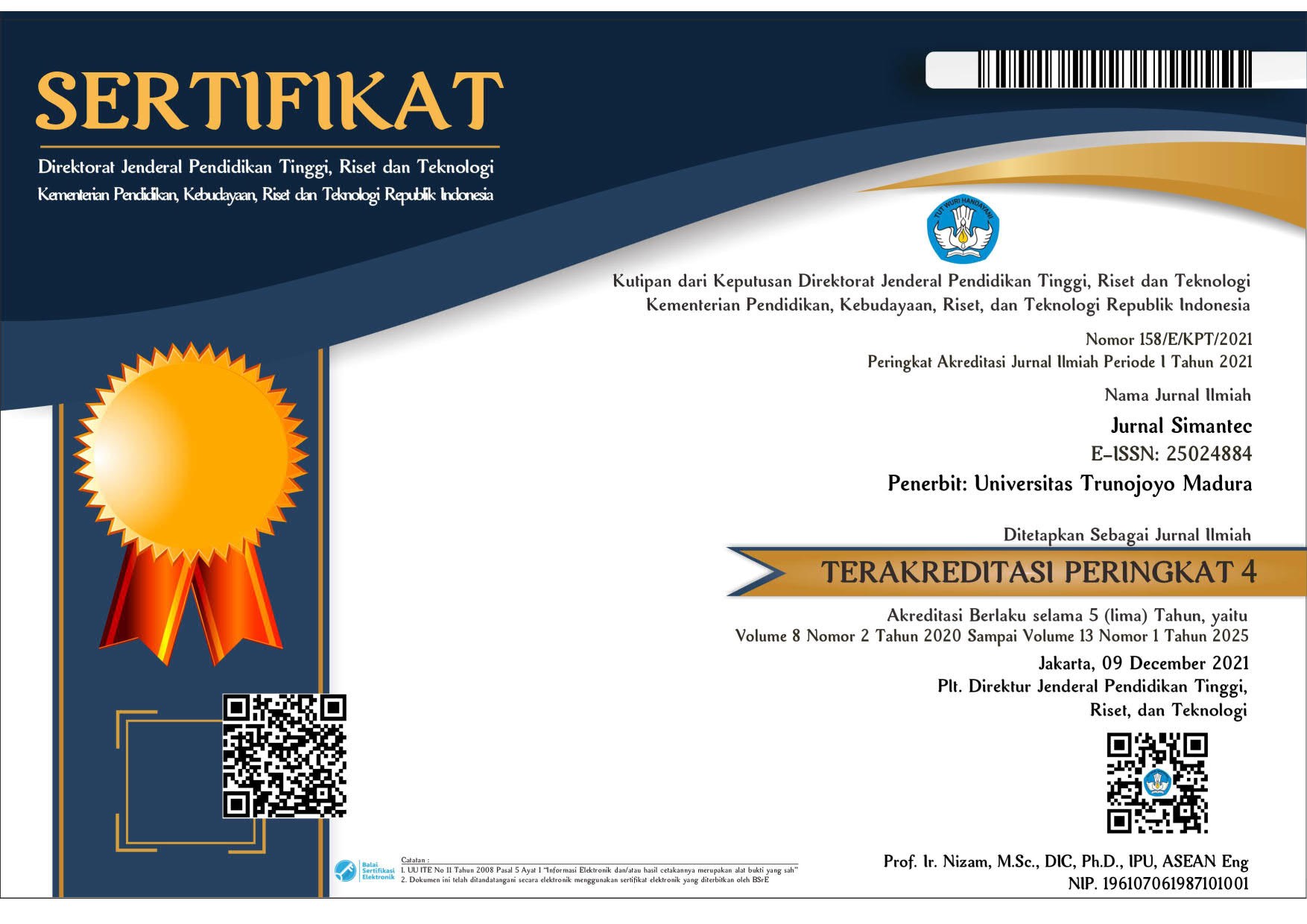ESTIMASI PENGELOLAAN SUATU PROYEK DALAM PENGEMBANGAN PERANGKAT LUNAK MENGGUNAKAN ANALISA FUNCTION POINT
Abstract
ABSTRAK
Upaya dalam pengembangan perangkat lunak merupakan hal yang penting dalam industri perangkat lunak. Pada paper ini, klasifikasi sistem perangkat lunak untuk menentukan estimasi usaha yang akan dilakukan dengan cara pengukuran berbasis Function Point dengan metode Application FP Count berbasis perhitungan DET, RET, dan FTR. Tujuan dari paper ini adalah untuk digunakan sebagai perkiraan pengukuran waktu dan biaya dalam pengerjaan proyek sehingga akan diperoleh hasil yang akurat dan dapat digunakan sebagai perbandingan dengan proyek baru yang serupa. Hal ini membuat upaya pengembang menjadi lebih mudah dalam pengelolaan suatu proyek dengan memperhitungkan ILF, EIF, EI, EO, dan EQ dari sebuah proyek lama dan kemudian didapatkan nilai FP yang digunakan untuk estimasi proyek baru. Untuk studi kasus digunakan sebuah software aplikasi sekolah (Teacher Manager). Dalam estimasi, diasumsikan proyek dikerjakan 200 jam/92.4FPs (2.16 jam/FP) dan dikerjakan oleh 2 pengembang. Pengembang mampu mengerjakan 2.5 jam/FP sehingga proyek dikerjakan selama 231 jam. RUSA merupakan proyek yang didalamnya terdapat fitur Teacher Manager dengan FP 115 dan dikerjakan oleh 2 orang. Modul ini paling lama akan dikerjakan selama 200 jam/115 FPs (1.74 jam/FP). Jika pengembang hanya mampu mengerjakan 2.5 jam/FP maka proyek ini akan dikerjakan selama 287.5 jam. Biaya pengerjaan RUSA juga dapat diperkirakan dengan melihat tabel produktivitas.
Kata kunci : Function Point, Estimasi Proyek, Produktivitas, Application FP Count.
ABSTRACT
Efforts in software development are important in the software industry. In this paper, the classification of software systems to determine estimates of the business is to be conducted in a manner based measurement method Application Function Point Count FP calculations which based upon DET, RET, and FTR. The purpose of this paper is to be used as an approximate measurement of time and cost in a project that will obtain accurate results which can be employed as a comparison with similar new projects. This result makes the efforts of developers become easier in the management of a project taking into account the ILF, EIF, EI, EO, and EQ of a long project and then obtained FP value used to estimate the new project. For the case study used a software application (Teacher Manager). In the estimation, it is assumed the project worked 200 hours / 92.4FPs (2.16 hours / FP) and carried out by two developers. Developers can do 2.5 hours / FP so that projects are carried out for 231 hours. RUSA is a project in which there are features of the FP 115 Teacher Manager and done by two people. This module is the longest to be done during the 200 hours / 115 fps (1.74 hours / FP). If the developer is only able to work 2.5 hours / FP, then this project will be done for 287.5 hours. RUSA construction costs can also be estimated by looking at the table of productivity.
Keywords: Function Point, Project Estimation, Productivity, Application FP Count.
Full Text:
PDF (Bahasa Indonesia)References
Sun-Jen Huang, Chieh-Yi Lin, Nan-Hsing Chiu, “Fuzzy Decision Tree Approach for Embedding Risk Assessment Information into Software Cost Estimation Model”, Journal of Information Science and Engineering, pp. 297-313, 2006.
Vishal Sharma, Harsh Kumar Verma, “Optimized Fuzzy Logic based Framework for Effort Estimation in software Development”, International Journal of Computer Science, Pp 30-38, 2010.
Jyoti Mahajan, D., Dhruve, K, “REBEE – Reusability Based Effort Estimation Technique Using Dynamic Neural Network”, Global Journal Computer Science Technology, 11, (7), pp. 55–60, 2011.
Deng, J.D., Purvis, M.K., Purvis, M.A., “Software Effort Estimation: Harmonizing Algorithms and Domain Knowledge in An Integrated Data Mining Approach” Inf. Sci. Discuss. Pap. Ser., (5), pp. 1–13, 2009.
Mittal, H., Bhatia, P., “ A Comparative Study of Conventional Effort Estimation and Fuzzy Effort Estimation Based On Triangular Fuzzy Numbers”, International Journal Computer Science Security., (4), pp. 36–47, 2002.
Benton, A., Bradly, M, The International Function Point User Group (IFPUG) in Function Point Counting Practices Manual – release 4.1’. (SA), 1999.
Schatzberg, D.R., Total Quality Management for Maintenance Process Improvement, Journal Software Maintenance. Res. Pract., 5, (1), pp. 1–12, 1993.
Behrens, C. A., “Measuring the Productivity of Computer Systems Development Activities with Function Points”, IEEE Trans. Software Eng., SE-9, 648-652, 1989.
Eijogu, L. O., “Beyond Structured Programming: An Introduction to the Principles of Applied Software Metrics”, Journal .Struct. Progr. 11, 1990.
Alvin Alexander, How I estimate Software Development Project, 2014.
Yuri Marx Pereira Gomez., Functional Size, Effort and Cost of the SOA Projects with Function Points, 2011, diambil dari http://www.servicetechmag.com/system/application/views/I68/1112-2.pdf
DOI: https://doi.org/10.21107/simantec.v5i2.1379
Refbacks
- There are currently no refbacks.
Copyright (c) 2016 fityan aula juyuspan, Anita Hidayati
Indexed By
.png)

11.png)













